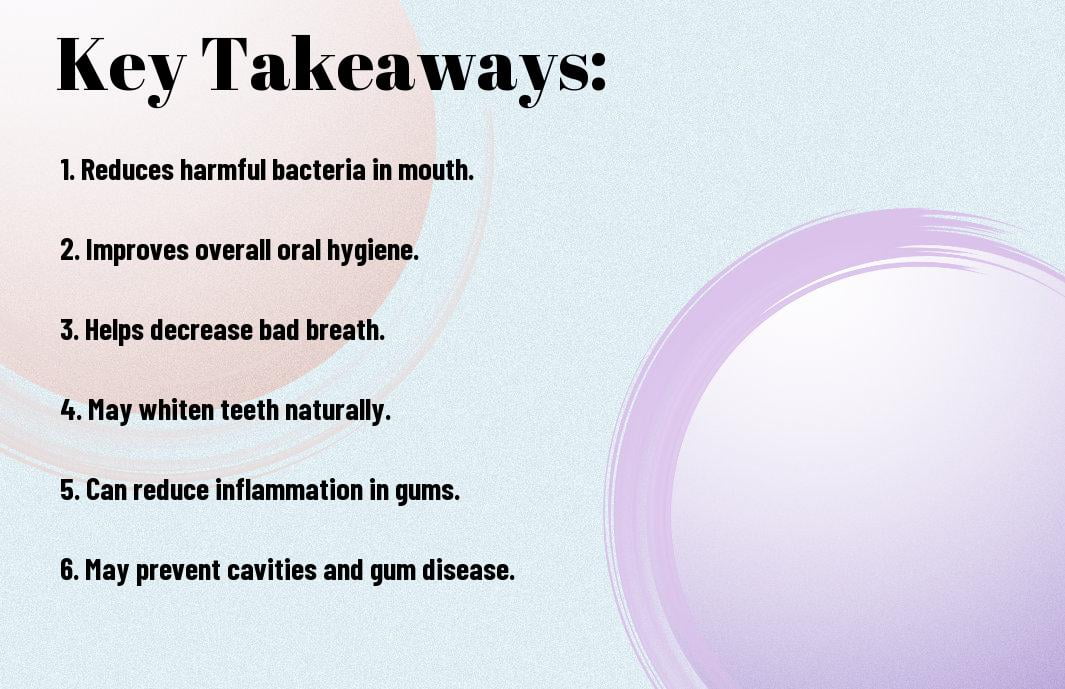Many people are turning to oil pulling as a natural remedy to improve their oral health. This ancient Ayurvedic practice involves swishing oil around in your mouth to remove bacteria and promote healthier teeth and gums. Not only can oil pulling help to reduce plaque and gingivitis, but it can also freshen breath and whiten teeth. In addition to its oral health benefits, oil pulling is a simple and cost-effective way to maintain good dental hygiene. Discover the advantages of adding oil pulling to your daily routine and enhance your overall oral health naturally.
Understanding Oil Pulling
Definition and Process
Oil pulling is an ancient practice rooted in Ayurvedic medicine that involves swishing oil around in your mouth to improve oral health. The process is simple yet effective, where you take a tablespoon of oil (commonly coconut, sesame, or sunflower oil) and swish it around in your mouth for about 15-20 minutes.
During this time, the oil mixes with saliva and binds to toxins, bacteria, and plaque on your teeth and gums. As you continue to swish, the oil becomes thinner and turns milky white. Once the time is up, spit out the oil into a trash can and rinse your mouth with water before brushing your teeth.
Types of Oils Used for Oil Pulling
In terms of oil pulling, the type of oil you choose can make a difference in the effectiveness of the practice. While coconut oil is the most popular choice due to its antimicrobial properties, sesame and sunflower oil are also commonly used for their benefits.
Each oil has unique properties that can help with different oral health issues, such as reducing inflammation, fighting bacteria, and whitening teeth. Recognizing the specific benefits of each oil can help you decide which one may be best for your oral health needs.
More Information on Types of Oils Used for Oil Pulling
For a more in-depth understanding of the different types of oils used for oil pulling, here is a breakdown:
- Coconut Oil: Known for its antimicrobial and anti-inflammatory properties
- Sesame Oil: Helps reduce plaque and improve oral health
- Sunflower Oil: Rich in antioxidants and beneficial for gum health
Recognizing the specific benefits of each oil can help you choose the best option for your oral health needs. Importantly, the information should be broken down into a table with 2 columns and 5 rows.
Oral Health Benefits
While there are numerous benefits to oil pulling for oral health, some of the most prominent advantages include reducing plaque and tartar buildup, as well as providing whitening and freshening effects for your teeth and gums.
Plaque and Tartar Reduction
Health professionals have long recognized the damaging effects of plaque and tartar on oral health. Oil pulling can help in reducing the presence of these harmful substances in the mouth. By swishing oil around the mouth, it can effectively pull out bacteria and debris that contribute to the formation of plaque and tartar on teeth and along the gum line.
Regular oil pulling as part of your oral care routine can significantly decrease the accumulation of plaque, which in turn helps prevent issues like cavities, gum disease, and bad breath.
Whitening and Freshening Effects
Oral health is not just about keeping teeth and gums healthy; it’s also about maintaining a bright, white smile and fresh breath. Oil pulling has been found to have natural whitening effects on teeth, helping to remove surface stains and discoloration over time. Additionally, the antimicrobial properties of oil can help freshen breath and combat the bacteria that cause bad breath.
This gentle and natural approach to whitening and freshening the mouth is a great alternative to harsh chemical treatments, offering a holistic way to improve both the health and aesthetics of your smile.
Scientific Evidence
Despite being an ancient practice, oil pulling has garnered a lot of attention in the scientific community for its potential benefits in oral health. Numerous studies have been conducted to evaluate the effectiveness of oil pulling in reducing plaque, gingivitis, and bacteria in the mouth.
Clinical Studies on Oil Pulling
The scientific community has shown interest in the effects of oil pulling on oral health. Studies have demonstrated that oil pulling with sesame or coconut oil can significantly reduce the levels of Streptococcus mutans, a bacteria known to contribute to tooth decay and gum disease. Additionally, research has indicated that oil pulling can reduce plaque formation and improve overall oral hygiene.
The findings from these clinical studies suggest that oil pulling can be a valuable adjunct to regular oral care practices. Incorporating oil pulling into your daily routine may help improve oral health and reduce the risk of dental problems in the long run.
Expert Opinions and Recommendations
On the subject of oil pulling, experts in the field of dentistry have shared their insights and recommendations. Many dental professionals support the use of oil pulling as a complementary therapy to traditional oral care practices. Some experts recommend oil pulling as a natural way to maintain oral hygiene and promote healthy gums.
To get the maximum benefits from oil pulling, it is important to use high-quality organic oils and practice the technique consistently. Consulting with a dentist or dental hygienist can provide personalized guidance on integrating oil pulling into your oral care routine for optimal results.
Practical Guide to Oil Pulling
Unlike traditional brushing and flossing, oil pulling is a simple yet effective technique that can improve your oral health. This ancient practice involves swishing oil around in your mouth to remove bacteria and promote overall oral hygiene.
Step-by-Step Instructions
The table below outlines the step-by-step process of oil pulling to help you incorporate this beneficial practice into your daily routine:
| Step | Instructions |
| 1 | Take 1 tablespoon of oil (such as coconut or sesame oil). |
| 2 | Swish the oil around in your mouth for 15-20 minutes. |
| 3 | Spit out the oil into a trash can (do not swallow it). |
| 4 | Rinse your mouth with warm water and brush your teeth as usual. |
Tips and Best Practices
The key to successful oil pulling lies in consistency and technique. Here are some tips to enhance your oil pulling experience:
- Use high-quality, organic oil for the best results.
- Avoid swishing too vigorously to prevent jaw fatigue.
- Try oil pulling in the morning on an empty stomach for optimal benefits.
For instance, if you experience sensitivity or irritation while oil pulling, try reducing the swishing time or switching to a different type of oil. It’s important to listen to your body and adjust your oil pulling routine accordingly.
Summing up
Following this comprehensive look at the benefits of oil pulling for oral health, it is clear that incorporating this ancient practice into your daily routine can significantly improve dental health. From reducing harmful bacteria to fighting inflammation, oil pulling with coconut oil has been shown to be a powerful tool in maintaining oral hygiene. For more information on the subject, check out Oil Pulling: Transform your Dental Health – Healthline.







